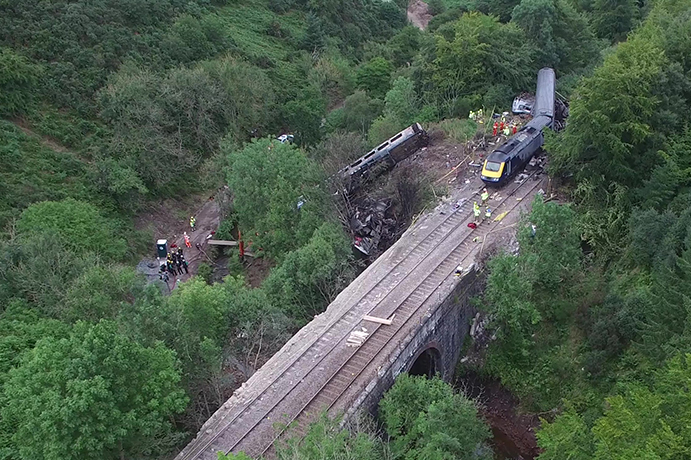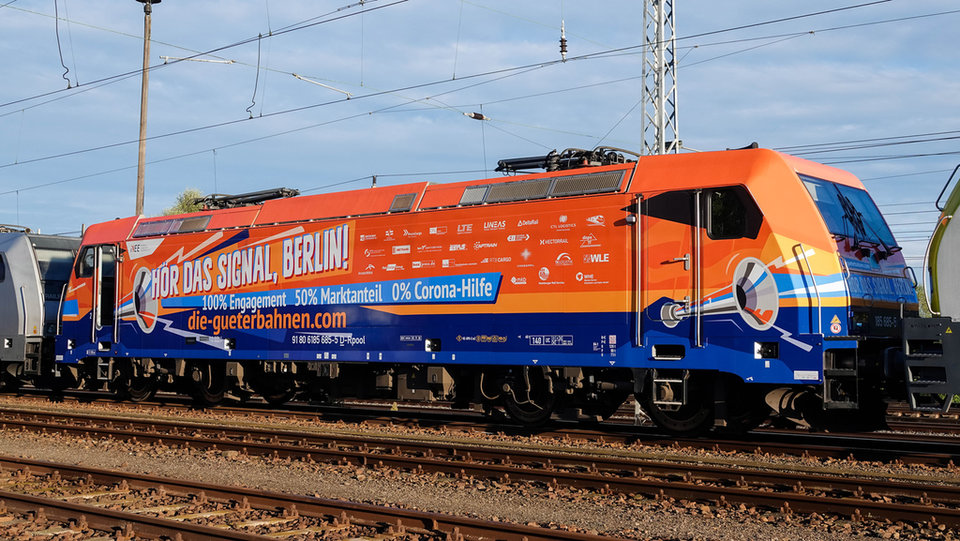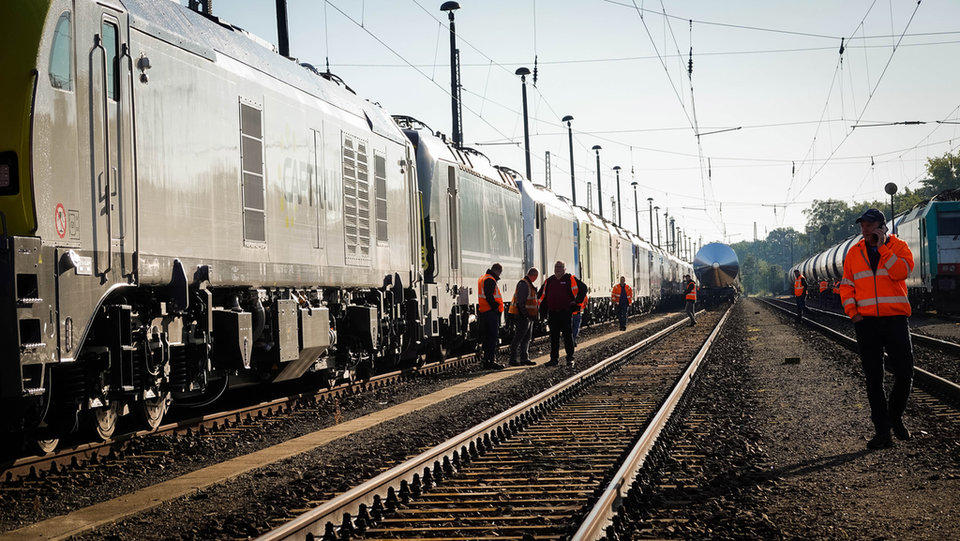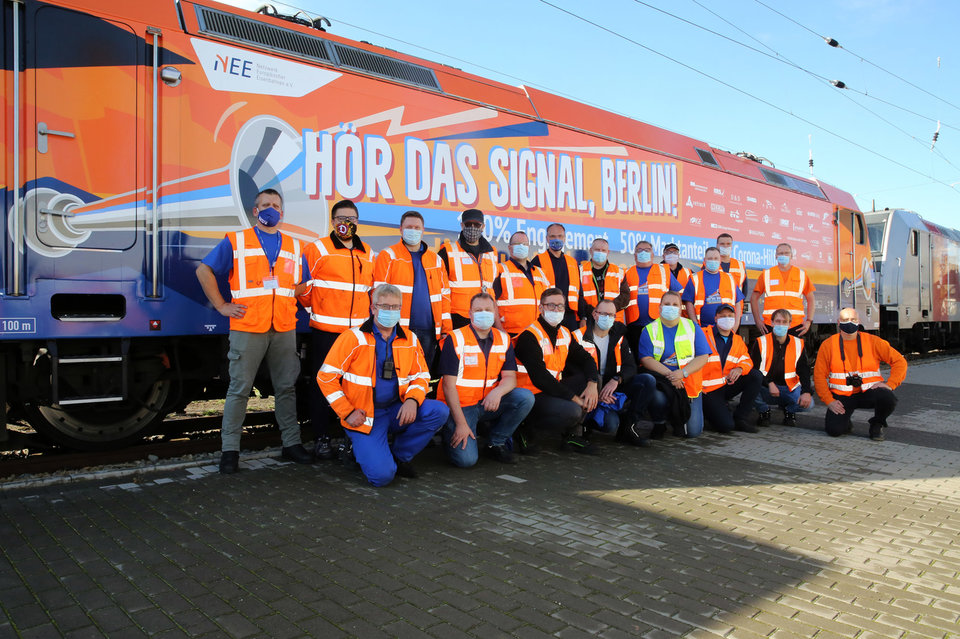Regional Focus
Is Germany creating a level playing field for rail operators?
Members of the German rail freight sector are protesting against the federal government for failing to support them during the Covid-19 crisis in favour of Deutsche Bahn, which they claim has been receiving preferential treatment. Do these claims hold water, and what role can the EU play in ensuring fair competition in Germany? Adele Berti finds out.
Ona crisp September morning, Berlin woke up to the sound of a train’s horns blasting as it passed through its main stations and the government quarter in the early sun. Adorned with the slogan ‘Hear the Sound, Berlin!’, the train’s 21 locomotives headed to the capital with a mission – to raise awareness on the unfair provision of federal financial aid for freight operators during the Covid-19 crisis.
The emphatic initiative was organised by 19 train operators from the Network of European Railways (Netzwerk Europäischer Eisenbahnen – NEE) and called out the government for allegedly giving state-owned franchise Deutsche Bahn AG (DB AG) preferential treatment during the pandemic.
Over three months later, the dust is still far from settled. The NEE has now moved on to involve the European Union on grounds of unfair competition, urging Brussels to take a stand on the issue and recognise the role they are playing during the pandemic.
With more lockdowns being imposed throughout Europe, they are now facing new limits on operations, financial setbacks and border closures throughout the continent, making state support crucial for their survival.

Aerial view of the derailment. Image: UK Government
100% commitment and 0% coronavirus help
2020 has been a turbulent year for freight companies, who have had to ensure their operations carry on as normal despite lockdowns and other disruptions. These have had significant impacts on German operators, with members of the NEE expecting a 10% drop in sales this year.
“At times of border closures, it was problematic for the staff to reach their workplaces and they had to improvise,” explains NEE external communication officer Christianne Clever. “[With] hotel closures, it is a challenge to find overnight accommodations for the travelling staff. There were overcapacities in the freight market due to the decline in industrial production, which led to increased price wars, especially with the road freight sector.”
With Germany keen to shift its cargo operations away from the road and towards the more sustainable railways, NEE members are eager to expand their business to support this move. However, when reports that the government intended to grant DB Cargo up to €5bn in financial relief started circulating in September, the group felt a keen lack of support for their own growth ambitions.
The general economic coronavirus aid of the federal government that has been initiated so far does not offer effective help
Their feelings were unequivocally expressed on one of the protest train’s locomotives, a shiny orange wagon bearing the slogan: “100% commitment, 50% market share, 0% coronavirus help”.
Indeed, NEE figures show that private rail companies in Germany make up half of market shares when it comes to freight and 40% in passenger transport – a portion that the NEE claims was not reflected by the government’s distribution of aid funds during the pandemic. “The general economic coronavirus aid of the federal government that has been initiated so far does not offer effective help for any freight rail undertaking (RU),” says Clever.

The protest train passing through Berlin, Germany.
NEE’s claims against Deutsche Bahn
Beyond failing to receive state support in the wake of the crisis, the NEE and other rail companies are accusing the government of favouring Deutsche Bahn and its cargo division. The second-largest transport company in the world and the biggest rail operator and infrastructure owner in Europe, DB is an emblem of German rail excellence around the world. However, it has struggled with financial difficulties that were exacerbated by the pandemic.
With a current debt of over €24bn, the company has seen a rapid drop in revenues during the crisis, prompting Berlin to consider letting it incur more debt and avoid collapse earlier in May. This would help plug a budget hole of between €11bn and €13.5bn through 2024, which would be added to the government’s plan to inject the €5bn and let DB borrow up to €8bn this year alone.
DB Cargo is part of the federally owned Deutsche Bahn AG, which is organised in its entirety as a stock corporation
At the time of writing, the plan pending the approval of the European Commission, though the NEE believes these sums go against Brussels’ competition regulation and should be overruled. “It should be noted that DB Cargo has other options for action,” says Clever. “DB Cargo is part of the federally owned Deutsche Bahn AG, which is organised in its entirety as a stock corporation. DB AG tries to counteract its enormous losses with equity capital increases worth billions, which in turn are financed by tax revenues.”
This, she adds, is something that other RUs are not able to do as they are privately owned. “This imbalance leads to competitive distortions with all their negative consequences and thus risks the existence of our companies,” she says. “Since the non-DB companies deliver more than half of the rail freight market, it would be a major problem if these companies could no longer operate as they do now and these dynamics also endanger the goal of shifting traffic from road to rail.”
DB Cargo has so far not responded to Future Rail’s request for comment.

A Google Earth image showing key locations to the crash. Image: UK Government
What is the EU doing?
Earlier in 2020, the Commission adopted a regulation that provided financial support to rail companies by allowing member states to lift track access and reservation charges. A key clause in this allowance is that any form of aid should come in a non-discriminatory way, which the NEE largely welcomed.
“These targeted emergency rules are designed to ensure the continuity of rail transport by reducing the risk of Covid-19-related bankruptcies in the sector, which has been badly affected by a temporary lack of demand for transport services,” Andreas Scheuer, German Federal Minister for Transport and Digital Infrastructure and president of the Council, told Rail Journal in September.
“To ensure the fair treatment of operators, the relief measures will apply in a strictly neutral, economically justified and transparent way. A sustainable rail sector is key to achieving EU climate goals and ensuring connectivity across Europe and is one of the top priorities of the German presidency.”
Relief measures will apply in a strictly neutral, economically justified and transparent way
Meanwhile, the EU is currently reviewing DB Cargo’s future and its need for financial support. In a bid to influence this decision, in September the NEE wrote a letter to the Commission, urging it to avoid favouring DB AG over its competitors. At the end of November, reports started circulating that the Commission was ready to approve only half of the proposed €5bn support for DB AG, in what was dubbed a “beacon of hope” by NEE members.
In a statement, the group expressed its approval of the decision and the strict conditions it is expected to come with. “Help for DB because of pandemic damage is money well invested,” it added, hinting that DB’s financial struggles are due to its own mismanagement rather than the pandemic. “Everything else jeopardises competition on the railways that have been liberalised since 1994.”
As it continues its call for support at a national and European level, the NEE is also hoping for more investment in “smooth and efficient rail operations” – a move that sits well with the EU’s proclamation that 2021 will be the ‘European Year of Rail’.
“We want the EU to give the highest priority to shifting traffic from road to rail and to create the conditions for both well-working national transport and the interoperability of the rail system in Europe,” Clever concludes. “In concrete terms, this means more infrastructure and further massive technological modernisation.
“Also, we need better political regulation with a special focus on charges. At any rate, the EU authorisation for infrastructure managers to reduce or suspend Track Access Charges during the crisis is already a big step forward.”
